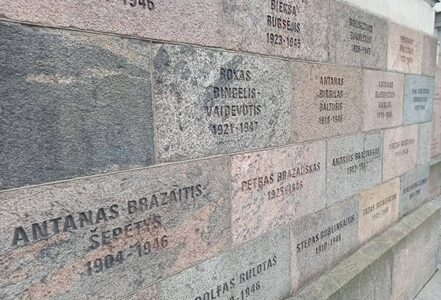Photo: Outer wall of so-called Genocide Museum on Vilnius’s main street near parliament. Personal collection.
by Grant Gochin
One of the greatest public relations catastrophes of president Reagan’s tenure was his May, 1985, visit to a cemetery in Bitburg, Germany, which contained numerous members of the SS. Today, nearly four decades later, the visit is still remembered with anger, amazement and mostly, for America, embarrassment.
NATO has announced that the next meeting of NATO heads of state and government will be held in Vilnius, Lithuania, on July 11-12, 2023. There are, unfortunately, obvious parallels to Reagan’s “goodwill” visit to Bitburg.
In World War II, and primarily in the second half of 1941, about 200,000 Lithuanian Jews–about 96%–were systematically expelled from their homes, robbed, starved, tortured, and brutally murdered primarily by ethnic Lithuanian death squads euphemistically referred to as “auxiliary police” units. Lithuania does not acknowledge the fact that most of the mass murderers were ethnic Lithuanians. To the contrary, Lithuania in many cases has elevated the stature of many of those who led the Lithuanian Holocaust, arguing that they were anti-Soviet. This itself is an echo of the Nazis’ canard conflating Jews with Communism.
During this NATO summit the Government of Lithuania will likely take heads of state and delegations to four locations often shown to visiting dignitaries:
1. The “Genocide Museum,” an institution unique in the world premised on the contention that ethnic Lithuanians, rather than Jews, were the primary victims of genocide in the 20th century;
2. The Antakalnis Cemetery, their national cemetery;
3. Wroblewski Library of the Lithuanian Academy of Sciences;
4. Tuskulėnai manor
Lithuania will characterize these locations as mere sites of national historical importance, hoping to deceive naïve foreign leaders.
Full article here.


